Key takeaways:
- Understanding one’s voice involves recognizing personal values, experiences, and the influence of background on storytelling.
- Early challenges, such as fear of speaking and lack of encouragement, were pivotal in shaping the author’s journey towards finding their authentic voice.
- Identifying mentors and influences provided essential support and guidance, fostering confidence in self-expression.
- Practicing self-discovery through journaling, art, and engagement with communities helped build confidence and refine communication skills.
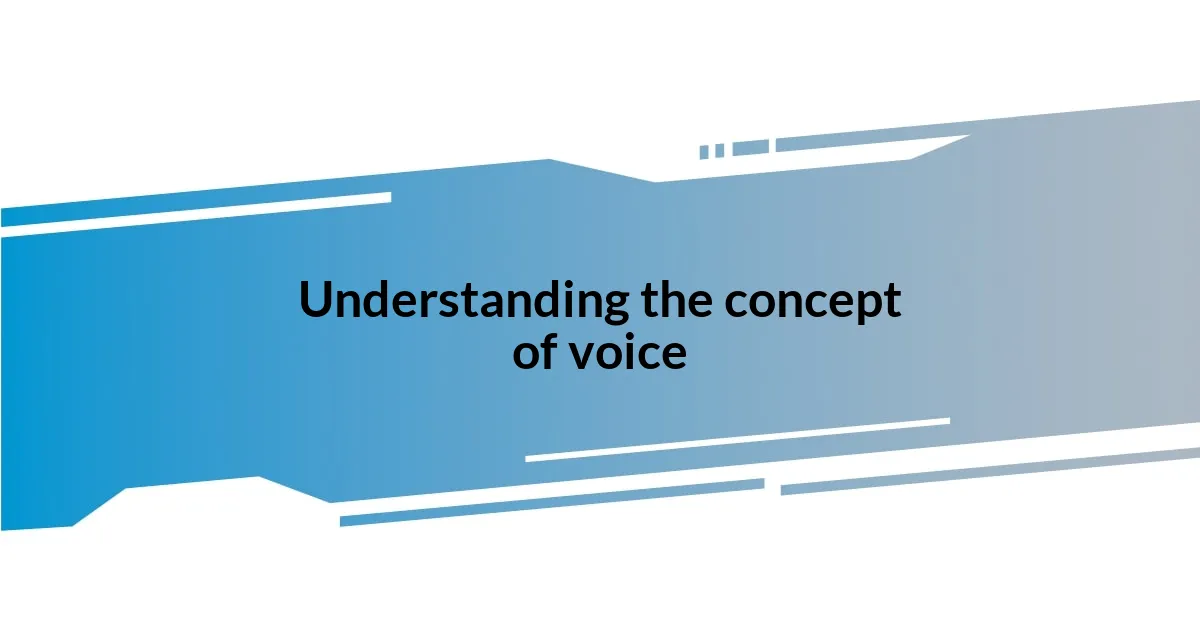
Understanding the concept of voice
Voice is not just the sound we make; it’s the essence of who we are. I remember struggling to express my thoughts fully during a discussion in college, feeling overshadowed by more vocal classmates. Have you ever felt that way? That realization pushed me to unpack what my voice truly meant—my values, beliefs, and experiences waiting to be shared.
Exploring one’s voice involves understanding one’s unique perspective—like a fingerprint that makes you, you. I often think about how my background influenced my approach to storytelling. For instance, my love for nature grew from childhood hikes with my parents, shaping the narratives I share today. Isn’t it interesting how our experiences paint the canvas of our voice?
Ultimately, voice is a blend of authenticity and courage. When I first started writing, I hesitated to let my true self shine through my words. What if people didn’t relate or understand? Yet, I found that the moments I leaned into vulnerability resonated most deeply with others. It’s a powerful reminder that our voice flourishes when we embrace our stories, not shy away from them.
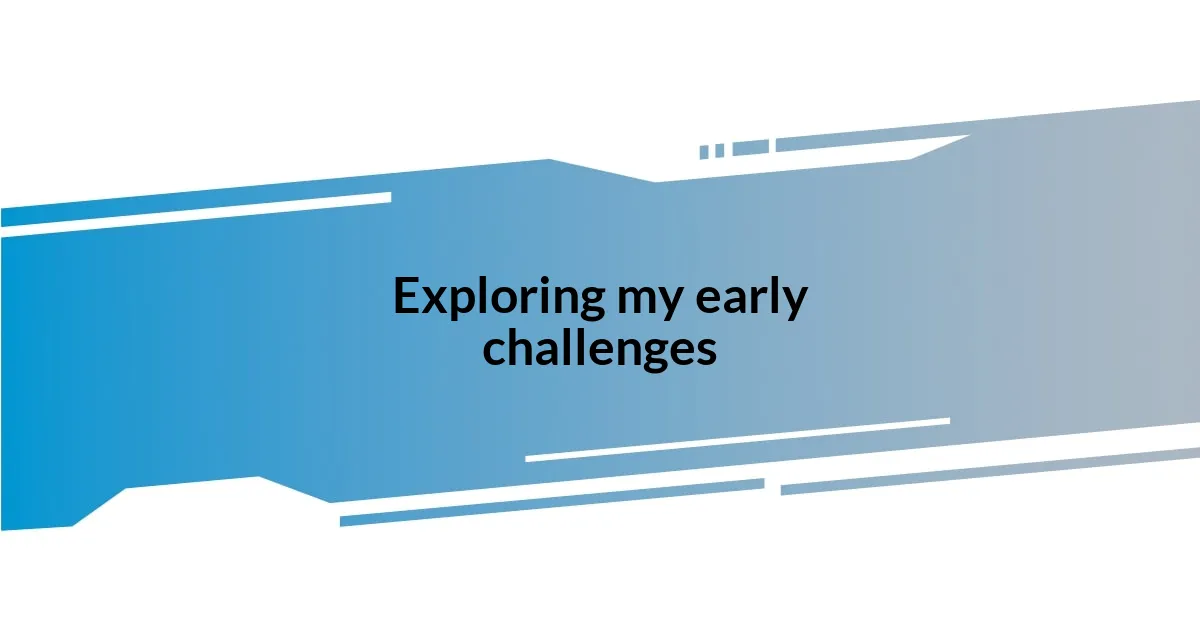
Exploring my early challenges
My early journey was often turbulent, filled with doubt about my ability to communicate. I distinctly remember a high school presentation that left me shaking; my voice felt trapped in my throat while my classmates spoke with confidence. The fear of judgment and the weight of expectations made it challenging to find my footing, leading to moments of retreat instead of engagement.
Here are some of the challenges I faced during those formative years:
- Fear of speaking: Whenever it was my turn, my heart raced, and I often stumbled over my words.
- Comparison with peers: Witnessing others express ideas so effortlessly made me question my own abilities.
- Limited encouragement: At times, I felt my contributions went unnoticed, which further stifled my desire to speak up.
- Lack of practice: Opportunities to express myself were rare, making it harder to break the silence I had created around my voice.
These experiences may seem small but laid the groundwork for my long journey to discover my authentic voice. Each moment of uncertainty taught me vital lessons about perseverance and self-belief.
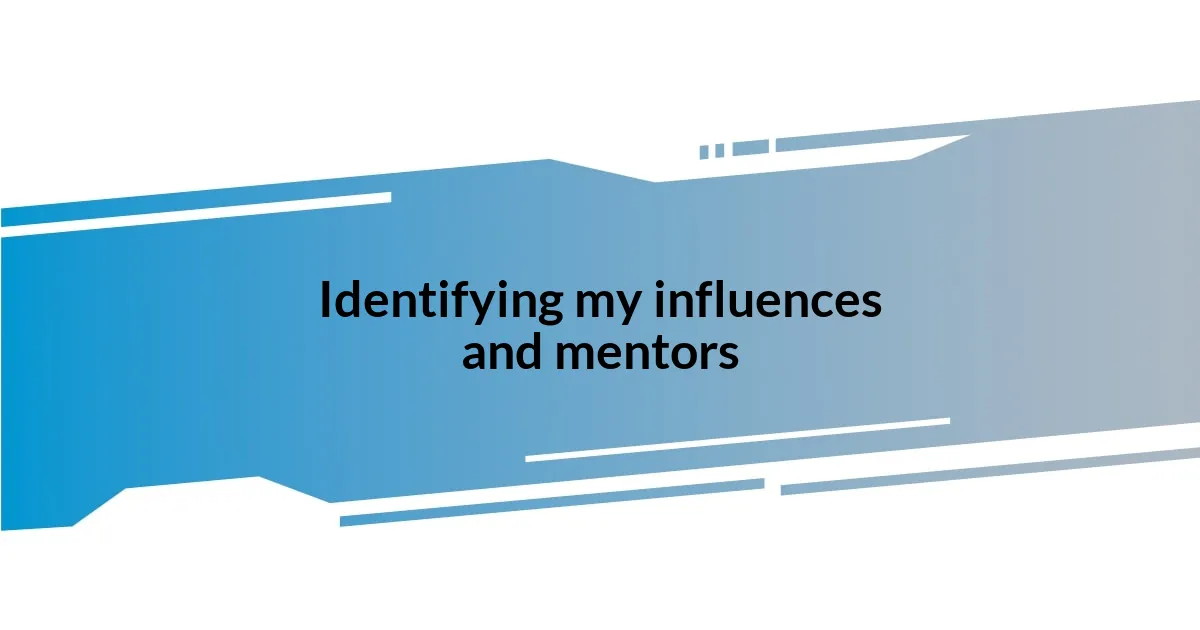
Identifying my influences and mentors
Identifying my influences and mentors has been a pivotal part of my journey towards finding my voice. I’ve often looked to the people around me for inspiration, whether they were teachers, authors, or friends who exuded confidence in their expressions. I remember a professor in college who offered me guidance during my struggling writing phase. Her feedback felt personalized and resonated deeply with me. It was her belief in my potential that sparked my determination to find and hone my own voice.
Reflecting on my childhood, certain figures emerged as vital influences. I had a mentor in my literature club who encouraged me to share my perspectives during discussions. Each session felt like stepping onto a stage, where I could express my thoughts freely. This safe space helped quell my fears and allowed me to explore the depths of my opinion. I often think back to those moments; they taught me the power of community and support in nurturing one’s voice.
The contrasting styles and backgrounds of my mentors also shaped how I view communication. Some imbued their words with poetic elegance, while others were direct and straightforward. I learned that there isn’t a ‘one-size-fits-all’ approach to expressing oneself. Each interaction influenced my understanding of what it means to communicate authentically. It’s fascinating how diverse elements can inspire our individuality.
| Influences | Impact on Voice Development |
|---|---|
| College Professor | Provided personalized feedback and instilled belief in my potential. |
| Literature Club Mentor | Created a safe space for discussion, allowing exploration of my thoughts. |
| Peer Friends | Encouraged open dialogue, helping me understand diverse communication styles. |
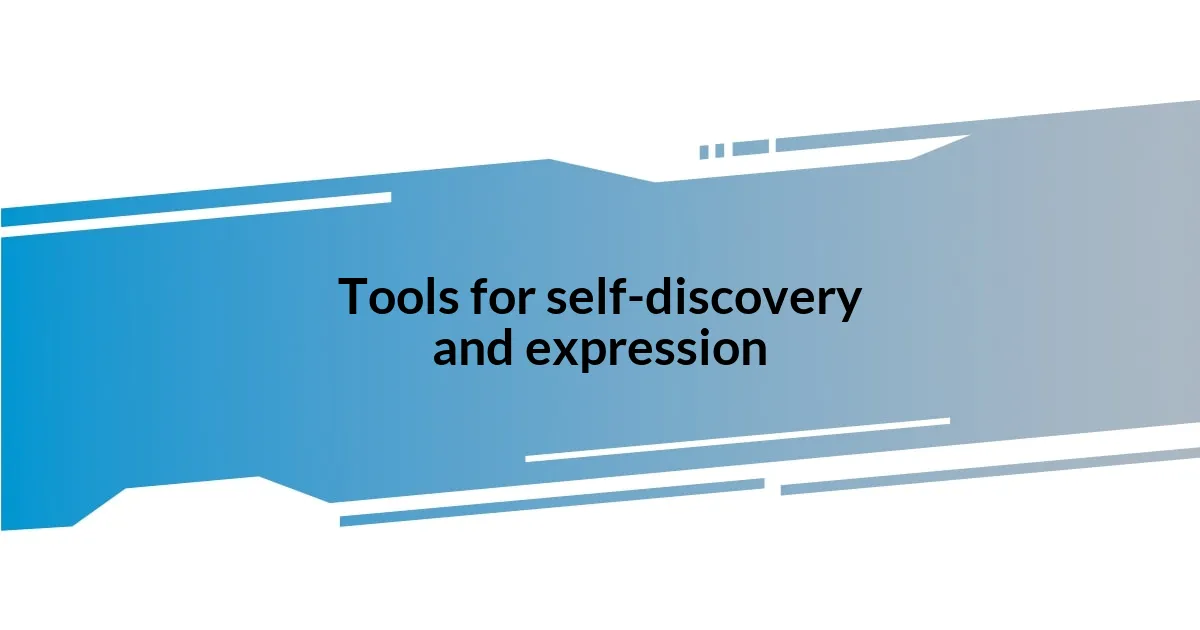
Tools for self-discovery and expression
Finding tools for self-discovery and expression has been essential in my journey. I remember the first time I picked up a journal; it was like unlocking a treasure chest within myself. Writing about my thoughts and feelings unveiled layers of my identity I hadn’t fully recognized. Journaling encouraged me to confront my fears and reshape my narrative. Have you ever felt a sense of release after finally putting your thoughts on paper? It’s a profound experience that can draw you closer to understanding your true voice.
Art has also played a significant role in my self-discovery. One afternoon, I decided to try my hand at painting after years of admiring others’ work. As colors splashed across the canvas, I felt an unexplainable freedom; I was no longer confined by words alone. It was as if each brushstroke silenced the inner critic that often stifled my expression. Engaging with art allowed my emotions to flow organically, and I often found unexpected clarity while creating. Art, in all its forms, can be a powerful outlet for expression. Have you thought about how creativity can communicate feelings that words sometimes cannot?
Finally, connecting with communities that share similar aspirations opened up new avenues for expression. I recall joining a local spoken word group; the first time I stood in front of the mic, my palms were sweaty, but the energy in the room was mesmerizing. Listening to others share their struggles and triumphs inspired me to step into vulnerability. It revealed the beauty of sharing our stories and recognizing that we’re not alone in our journeys. Have you ever felt empowered by others’ stories? This connection fosters growth and can ignite a passion for your own expression, turning individual experiences into a shared journey of discovery.
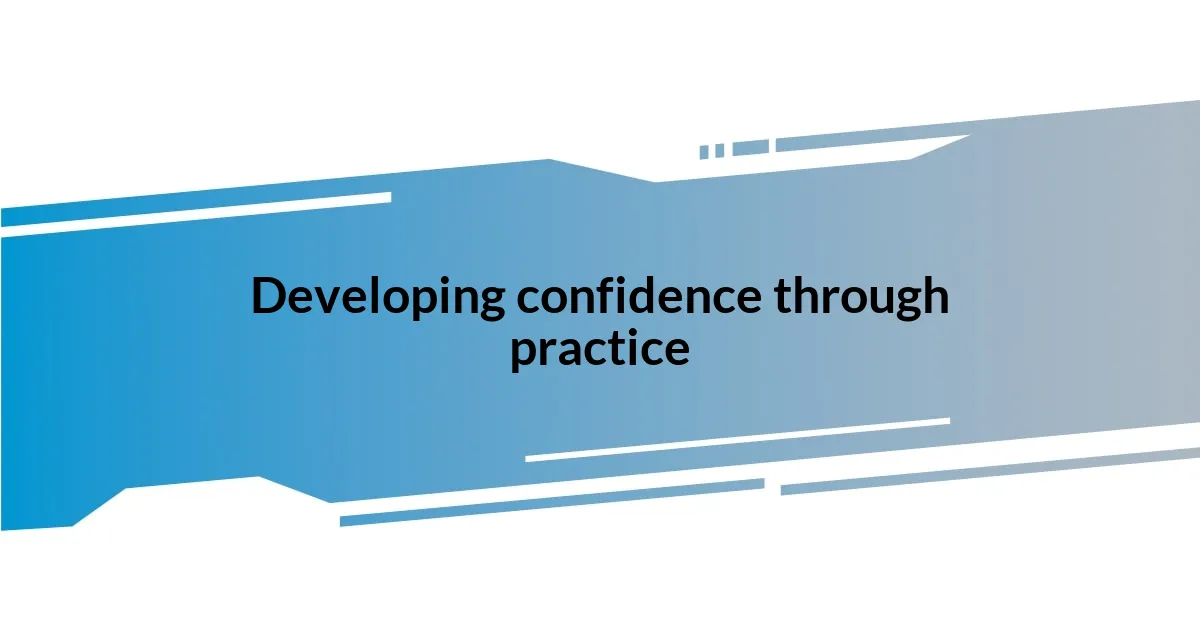
Developing confidence through practice
Building confidence through practice is something I’ve embraced more deeply over the years. I recall attending my first open mic night, trembling at the thought of sharing my poetry. But as I read aloud, feeling the warmth of acceptance from the audience, I realized that every performance was an opportunity to strengthen my voice, however shaky it might have sounded at first. Have you ever experienced that exhilarating mix of nerves and excitement? It’s a feeling that can only be harnessed through practice.
Each time I stepped up to the mic, I discovered something new about myself. I experimented with different styles, from dramatic readings to light-hearted verses, and each exploration felt like a brick added to the foundation of my confidence. I remember one night when I delivered a piece that resonated with a listener so deeply they approached me afterward with tears in their eyes. Moments like these underscore how practice not only refines our skills but also deepens our connection with others. Wouldn’t it be amazing to find a way to impact someone’s journey through your own voice?
Moreover, practice extends beyond performance; it stretches into daily life. I’ve found that engaging in conversations, whether casual or serious, bolstered my ability to articulate my thoughts clearly. It’s almost a ripple effect: as my confidence grew in front of an audience, it seamlessly translated to my interactions with friends and family. Have you noticed how your comfort level in speaking changes when you commit to regular practice? The more I exercised this skill, the easier it became to share my beliefs, and that’s when I truly began to feel like my voice mattered.